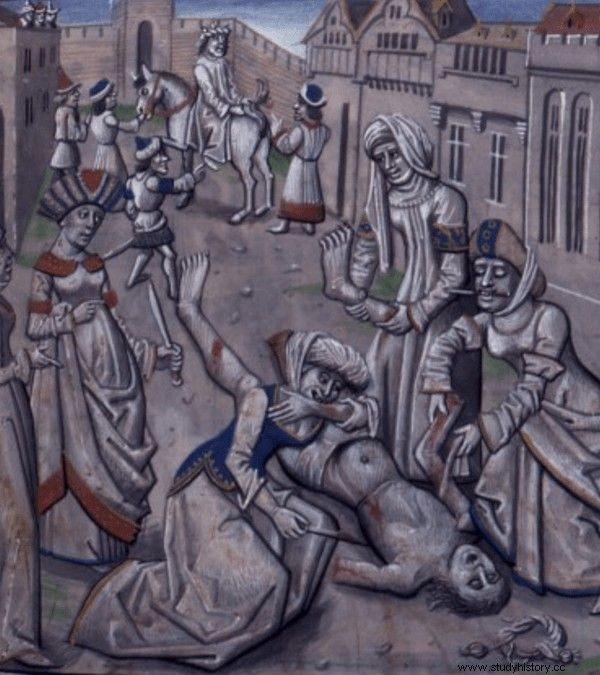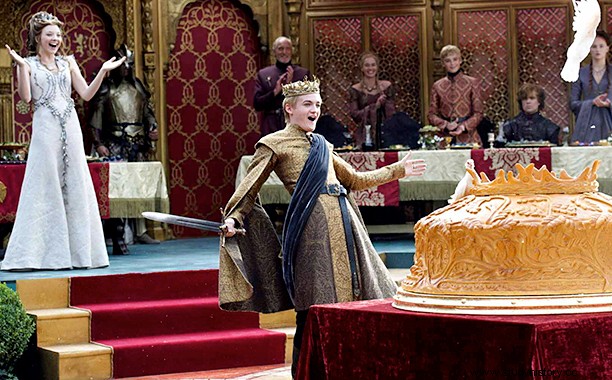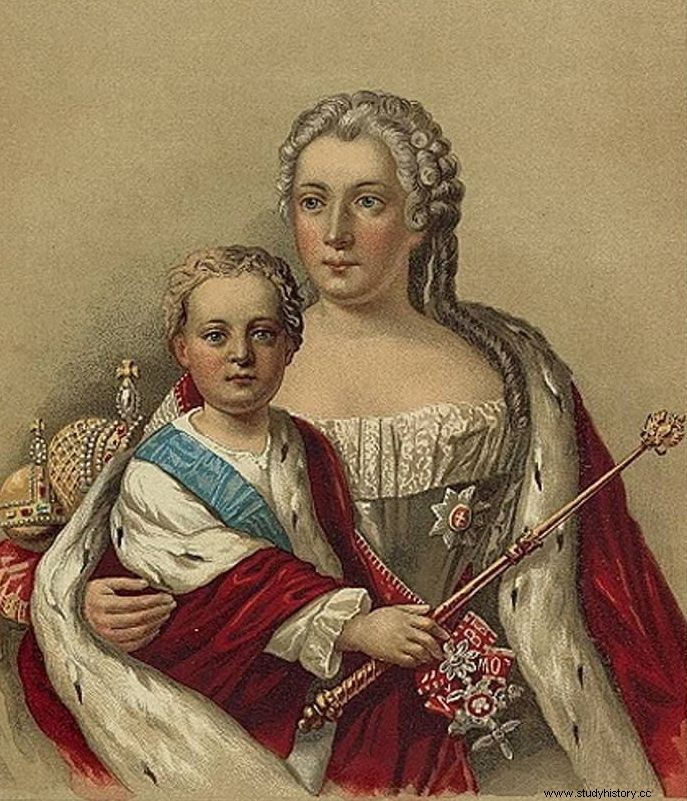They were imprisoned, tortured, castrated and killed only because they inherited the crown from their fathers. Here are three stories to prove that sometimes it's better not to be born into a ruling family.
Alexios II. He sentenced his own mother
Alexios II Comnenus became the ruler of the Byzantine Empire at the age of 11. The year was 1180, and the empire was still regarded as a true colossus on the political map of the world. Only it was a colossus on clay legs. In Constantinople, hatred against newcomers from Western Europe grew, to whom Alexius II's father bestowed numerous privileges (they swarmed with crusades). Additionally, the mother of the new emperor became regent - Maria, the Antiochian princess, deprived of any real influence.
There were traditional clashes between coteries at the court, and from the side of Anatolia one of the imperial relatives, Andronik Komnen, was approaching. The news of this in the capital led to a pogrom of Latin people - thousands of people died and the city drowned in blood.
Andronik entered the capital without any problems and actually seized power. He liquidated one competitor after another. Only Alexius II chose to spare. He still needed the kid. In 1182, the thirteen-year-old Emperor was forced to sign a sentence which he condemned his mother to death.

Andronika received a well-deserved punishment. After a few years, he died a brutal and painful death. His arm was cut off, his eyes gouged out, tortured and handed over to an enraged crowd.
A year later it was his turn as well. Andronicus's three henchmen strangled the fourteen-year-old ruler. They cut off his head, which they showed to their principal, and threw his body into the sea.
William III. Castrated and blinded
In February 1194, William may have been seven or eight years old, and his father, the Sicilian king Tancred of Lecce, had just died. The mother took over the reign on behalf of the young man. Perhaps the boy would live to come of age on the throne, if not for Aunt Konstancja and her husband, Emperor Henry VI, who also liked the kingdom in southern Italy.
The invasion of Sicily was a matter of several months. Admittedly, William III's followers resisted the invaders, but in the end their advantage turned out to be too great. The queen-mother made a deal with the emperor. William renounced the Sicilian crown, in return getting the County of Lecce and the Duchy of Taranto. In the situation they found themselves in, it would be a pretty good deal. Provided the emperor would keep his word.
On December 25, 1194, Henry was crowned King of Sicily in Palermo; his little predecessor witnessed this celebration. The idyll ended a few days later. According to the official version, William's supporters formed a conspiracy against the new ruler, and Henry only reacted to the act of treason. According to the less official version, there was no conspiracy. It was just that the emperor needed an excuse to finally get rid of his predecessor.

Does the young king have this life? The story turns out to be even stranger and more brutal than fiction again ...
The former king, his mother and sisters were imprisoned along with some of their supporters. Henry had William III mutilated. English chronicler Roger of Howden reports that the boy was castrated. The German historian of Otto of St. Blasen wrote about being blinded. The "castration + blinding" mutilation package was popular in the Norman milieu (and the then Sicilian state was, after all, founded by the Normans). In Germany, however, a similar sentence must have aroused disgust and outrage. Perhaps that is why no local chronicler mentioned him.
The mutilated ex-king was imprisoned in the castle in Hohenems (now western Austria), where he presumably died in 1198. He lived 11 or 12 years.
Ivan VI. Eighteen years in the dungeon
He became Tsar of Russia in October 1740 as a two-month-old baby, and was dethroned thirteen months later. Elżbieta Piotrówna, the new ruler, on the day of the coup, assured the mother of Ivan VI that no one from her family would be hurt. She was lying.
First, the ex-tsar, his parents and siblings were imprisoned. When Ivan was four years old, he was separated from his family and placed in solitary confinement. Prisoner No. 1, as he was called, was aware of his origin, and once provoked by the guards, he even shouted that he was a tsar. When the guards informed their superiors about this, were given a free hand to use the flogging, stick and whip. Subsequent reports show that the prisoner no longer "spoke of any nonsense about himself." At the same time, the guards were ordered to kill Ivan in case of any attempt to escape or rescue.
After the death of Tsarina Elizabeth and the assumption of power by Peter III, there was hope for improving poor Ivan's fortune. As the American historian Robert K. Massie, author of the book “Katarzyna Wielka. A portrait of a woman ”:
In March [1762], Peter visited the gloomy Schlüsselburg Fortress, where the former Emperor Ivan VI had been staying for eighteen years (...). Confident that his place on the throne was safe, he thought of alleviating Ivan's fate, perhaps even freeing him and assigning him a position in the army. However, he changed his mind when he saw the condition he was in.

Ivan VI Romanov with his mother. Even before it all went down ...
Ivan, now twenty-two, was tall, thin, with waist-length hair. He could not write, he was poking out disconnected sentences and was not sure of his own identity. He wore torn and dirty clothes, a narrow bunk was used as a bed, it was stuffy in his cell, and the only source of light were small barred windows placed high up. When Peter offered to help, Ivan asked if he could have more fresh air.
(...) Before leaving the fortress, Peter ordered a building to be built in the courtyard in which the prisoner would have more fresh air and light ( Katarzyna the Great , pp. 239-240).
The unfortunate man did not live to see his new cell. A month later, Peter III was overthrown by his wife Catherine II. In the course of the struggle for power, the empress's opponents suggested replacing her with the "rightful" ruler Ivan. As the rebellion became a reality, the guards entered Ivan VI's cell. They dragged him out of bed and stabbed him eight times with a sword. Just in case.
There were more tragedies
The list of underage kings who met a tragic fate is almost endless. Alexander IV, son of Alexander the Great, who was murdered at the age of about 12, should certainly be placed on it. Around the same age, the Syrian king Antiochus V Eupator (died 161 BCE) was killed by his half brother. In 1483, the English king Edward V was imprisoned and he was not heard of - according to the popular version, he was murdered by his uncle Richard III. In 1795, ten-year-old Louis XVII, the legitimate successor of the guillotine Louis XVI, died in a revolutionary prison.
Thousands of years of civilization progress have not cooled down the universal lust for power. And in no era has there been a shortage of people willing to torture or kill children just to claim the crown.
